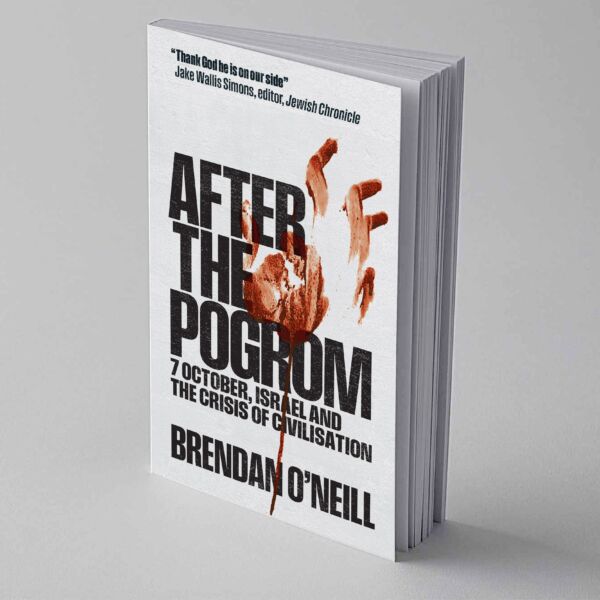The mainstream is so last year
James Harkin’s new book reveals what the rise of niche marketing represents: a growing trend for expressing one’s identity, and superiority, through consumption choices.

Want to read spiked ad-free? Become a spiked supporter.
James Harkin’s cracking new book, Niche: Why the Market No Longer Favours the Mainstream, is difficult to pin down. Which is ironic given the extent to which it talks about products finding their niche market.
There’s certainly something for businessmen to chew over here. There’s probably something that piques the economist, too. But if you come to it expecting a diagrammatic analysis of current market trends you might be a little disappointed – as some other reviewers seemingly have been. So is it a work of sociology then? Or a piece of sparkling cultural critique? Again, it’s both those things. But it’s more, too.
All of which makes Niche sound like the intellectual equivalent of Woolworths, a store that attempted to provide something for everyone, but, come the end, sold little to no one. This is a fate of which Harkin is all too well aware given Niche’s beautifully pithy account of the rise and fall of Frank Woolworth’s legacy. So, no, Niche is not Woolworths. It’s more like a boutique, one offering a range of well-crafted capsule accounts of the success and failure of various businesses and organisations, from Starbucks to the Institute of Contemporary Arts in London, but united by an ambiguous sounding leitmotif: the emancipation of the consumer.
In Harkin’s telling, we as a public, as consumers, were, for much of the twentieth century, held ‘captive’ by the ‘big beasts’ of commerce: media and politics. We could have any colour of car as long as it was black. We could read any book as long as it was recommended by the Readers Digest Book of the Month club. We could watch any movie we liked at the cinema, as long as it was Gone With The Wind. I exaggerate, of course, but Harkin’s point stands. Alongside the restrictive hand of a few large organisations, not only did a mainstream, ‘middle-brow’ culture flourish, but, and this is important to Harkin, a general public prevailed.
But no more. The middle has disintegrated. The mainstream has eddied. The public has become particular. This was something, as Harkin tells us with much brio, that clothes store Gap discovered to its cost. Founded in 1969 by a couple from San Francisco, Gap, as its name suggests, was initially a response to the so-called generation gap opening up between hippy youngsters and their frumpy parents. Instead of selling specific clothes to a specific market, Gap sought to sell unfussy casual wear to everyone. And sell it did. By the late 1990s, it was the biggest clothing retailer in the world. But, with sales dropping off, and younger people finding Gap’s offering a bit drab, a bit bland, a bit too mainstream, Gap attempted to target specific audiences to disastrous effect. By 2002, the store had suffered a 29-month-on-month sales drop. Yet, as Harkin tells it, when it tried to become what Gap used to be, a general all-purpose clothes store for the many, it found itself increasingly catering for the few. The middle had gone.
In its stead, as Harkin sees it, has risen the niche product. American broadcaster Home Box Office is illustrative here. Launched in 1972, HBO’s initial success was built on film premieres, live sporting events, stand-up and music concerts. By 1985 it had 14.6million subscribers. Ten years later, however, HBO was still attracting new subscribers, but the rate at which it was doing so was slowing. After all, other channels such as Showtime had emerged in the meantime and they were offering much the same fare. Enter HBO head of planning, Chris Albrecht. His masterstroke was to get HBO to provide a product that no one else was offering. In other words, to create a niche. And so HBO became producers of the highest-quality, writer-led drama around.
First there was prison drama Oz, then Sex and the City, then The Sopranos. Out came Curb Your Enthusiasm in 2000, quickly followed by Six Feet Under before, in 2002, Albrecht unveiled The Show By Which All Other TV Dramas Shall Now Be Judged: The Wire. As sprawling and complex as Balzac’s Comedie Humaine this wasn’t middle-brow, lowest common denominator TV. As The Wire’s writer David Simon described it in 2004, this was ‘Fuck the average viewer’ TV. In fact, so pleased was the less than average viewer that by 2004, HBO was raking in $1billion in profit.
In this HBO anecdote, there is a hint at that other phenomenon that accompanied the liberation of the consumer: The emancipation of the snob. Snobbery, the act of elevating oneself and dismissing others on the basis of how and what they consume, is nothing new of course. But whereas in the past the act of consumption might have been a marker of class distinction, it is now more fluid, more individuated. As Harkin puts it ‘since many of us identify ourselves by the things we like and the company we keep, the most successful of
That precisely who constitutes ‘us’ and ‘them’ is no longer explicitly determined by class shouldn’t be surprising. For what Harkin documents, sometimes only implicitly, is a shift in consciousness. That is, we no longer define ourselves in terms of relations of production, but in terms of relations of consumption. We are conscious of ourselves less in terms of shared political interests, but in terms of individual leisure activities, from a passion for Curb Your Enthusiasm to a predilection for streetwear.
The danger with Harkin’s admittedly compelling account of the new mode of consumption is that he naturalises it. That people now define themselves in terms of how and what they consume merely expresses and reflects our ‘passion to be different’. The problem with this, as Harkin acknowledges, is that ‘the rush to identify with others can blind us to what we have in common with everyone else’. But by focusing solely on the sphere of consumption, by treating it as an ‘ecosystem’ and thereby naturalising it, the basis for commonality is limited to, well, consumption. And there’s little solidarity to be found on the basis of Amazon shopping histories or coffee beans.
Not that this should be mistaken for a paean to single-channel TV. ‘For the most part we are better off’, Harkin rightly says. ‘The fact that we all used to watch the same TV programmes and channels, for example, does not mean that was all we wanted to watch… Besides the rich diversity more than makes up for what we have lost.’ But what we have lost – the general, the universal, the shared – was never based upon consumption. It was based upon politics, upon a contest over production.
No matter how well-finished the Moleskine, or compelling the True Blood episode, there is more to life than shopping. We are more than consumers.
Tim Black is senior writer at spiked.
Who funds spiked? You do
We are funded by you. And in this era of cancel culture and advertiser boycotts, we rely on your donations more than ever. Seventy per cent of our revenue comes from our readers’ donations – the vast majority giving just £5 per month. If you make a regular donation – of £5 a month or £50 a year – you can become a and enjoy:
–Ad-free reading
–Exclusive events
–Access to our comments section
It’s the best way to keep spiked going – and growing. Thank you!











Comments
Want to join the conversation?
Only spiked supporters and patrons, who donate regularly to us, can comment on our articles.